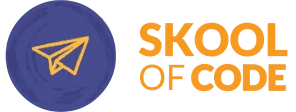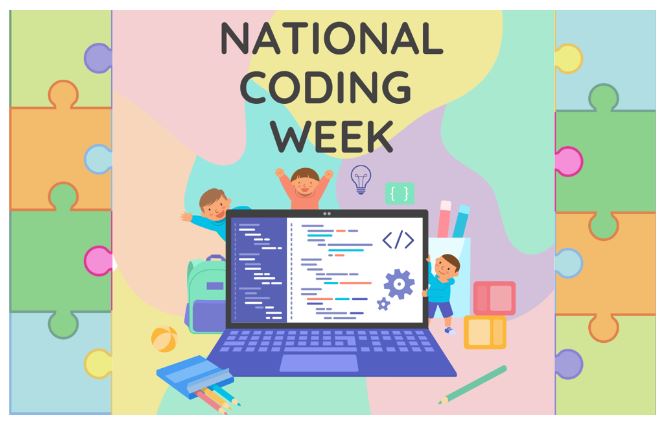National Coding Week, celebrated annually in September, is a time to recognize and promote the incredible benefits of coding. In our increasingly digital world, coding skills have become more essential than ever before. From enhancing problem-solving abilities to fostering creativity and innovation, coding offers a plethora of advantages.
As technology continues to advance at an astonishing pace, it’s no secret that coding skills are becoming increasingly essential. This year(2023), the theme of National Coding Week revolves around one of the most exciting and dynamic fields in technology: Artificial Intelligence (AI).
In this blog, we will delve into the significance of coding, discuss the appropriate age to start learning, and explore the benefits and valuable skills one can develop through coding. Along with a focus on AI, highlighting its boundless horizons and the opportunities it offers.
Benefits and Skillsets Woven by Coding
The benefits of coding and the skills developed through coding are closely related but distinct concepts. Here’s a breakdown of the key differences:
Benefits of Coding:
- Outcome-Oriented: Benefits of coding refer to the positive results or advantages that individuals or organizations gain from incorporating coding into their lives or operations.
- Practical Impact: These benefits are often tangible and practical, such as improved problem-solving, increased productivity, or better career prospects.
- External Perspective: They are often perceived from an external standpoint, focusing on the impact coding has on the world, individuals, or industries.
Skills Developed Through Coding:
- Process-Oriented: Skills developed through coding refer to the specific abilities and knowledge that individuals acquire as they learn and practice coding.
- Personal Growth: These skills are personal and cognitive in nature, including logical thinking, creativity, attention to detail, and algorithmic problem-solving.
- Internal Perspective: They are often viewed from an internal perspective, emphasizing the individual’s growth and development as a coder or programmer.
Here’s a categorized list of the benefits and skills gained through coding:
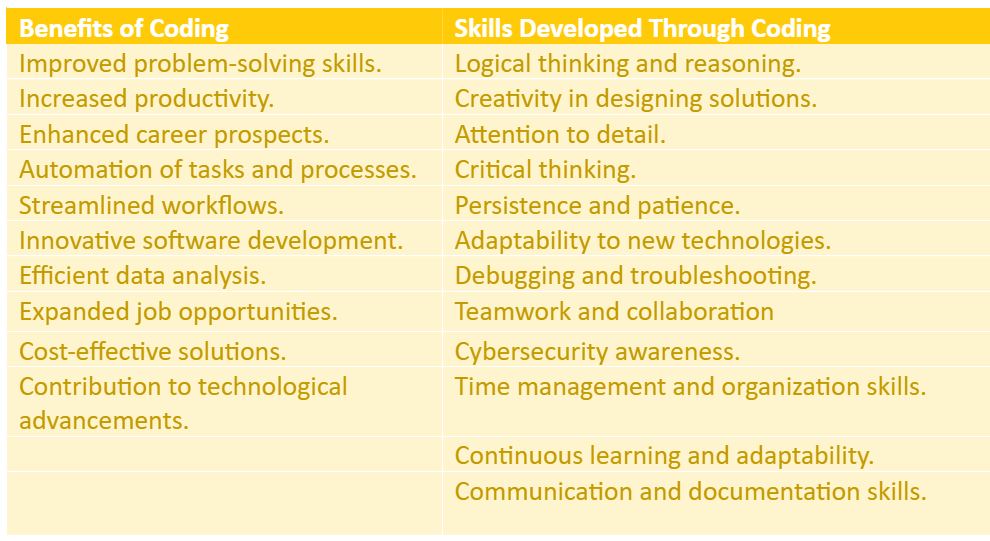
While the benefits of coding highlight the practical advantages gained from coding, such as career opportunities and efficiency, the skills developed through coding emphasize the personal growth and cognitive abilities that coding fosters, such as analytical thinking and creativity. Both aspects are interconnected and contribute to the overall value of learning and practicing coding.
Related reading :
The Appropriate Age to Start
Coding is accessible to individuals of all ages, but the ideal age to start learning can vary.
Here are some general guidelines:
- Early Childhood (Ages 4-7): Young children can start with basic coding concepts using games and interactive platforms designed for their age group. These activities can help develop logical thinking skills.
- Elementary School (Ages 8-12): Kids in this age group can begin to learn coding languages like Scratch or Blockly. These visual programming languages are designed to be kid-friendly and teach fundamental coding principles.
- Teenagers (Ages 13-18): Teenagers can delve into more advanced programming languages like Python, JavaScript, or Java. They can also explore specific areas of interest, such as game development, web design, or app development.
- Adults (Ages 18+): It’s never too late to start coding. Adults can benefit from coding bootcamps, online courses, or self-paced learning. The choice of programming language and specialization depends on personal goals and interests.
Parental Guidance: Coding the Future Together
Parents play a crucial role in nurturing their children’s interest in coding and helping them build coding skills.

Here are some effective ways parents can support and encourage their children in this endeavor:
- Start early with coding concepts.
- Lead by example and involve your child in your coding projects.
- Find age-appropriate coding for kids resources and courses.
- Create a dedicated coding environment at home.
- Encourage problem-solving skills.
- Celebrate your child’s coding achievements.
- Allow creative freedom in their coding projects.
- Support collaboration with peers.
- Attend coding events and workshops.
- Provide constructive feedback.
- Stay informed about coding trends.
- Balance screen time with other activities.
- Be patient and understanding during the learning process.
- Set realistic coding goals.
- Show genuine interest and ask questions about their coding journey.
By following these strategies, parents can not only help their children develop coding skills but also foster problem-solving abilities, creativity, and a lifelong love for learning. Remember that the key is to make coding enjoyable and to support your child’s journey as they explore the exciting world of technology and programming.
Related reading :
The Promise of AI
Artificial Intelligence (AI) is not just a technology; it’s a revolution. As we venture into the future, AI promises to reshape the world in profound ways, touching every aspect of our lives.
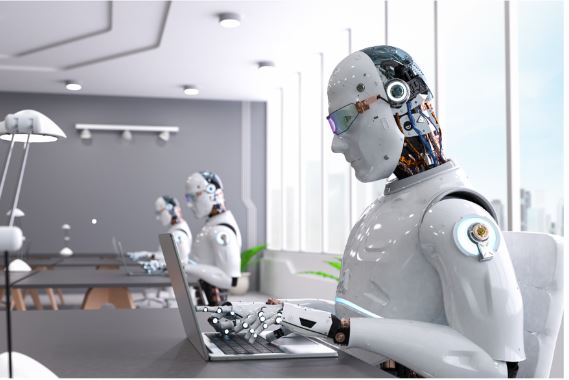
Here’s a glimpse into the future of AI and the incredible transformations it will bring:
- Smarter Everyday Living: Imagine waking up to a home that anticipates your needs—lights adjust, coffee brews, and the thermostat optimizes comfort. AI will make our homes more responsive and efficient, enhancing our daily lives.
- Healthcare Revolution: AI-powered diagnostics and personalized treatments will revolutionize healthcare. Machines will analyse medical data at lightning speed, leading to earlier disease detection and more effective treatments.
- Transportation Transformed: Self-driving cars will become the norm, reducing accidents and traffic congestion. AI-driven logistics will optimize supply chains, making deliveries faster and more efficient.
- Enhanced Education: AI tutors and personalized learning platforms will tailor education to individual needs, making learning more engaging and accessible to all.
- Creative Partners: AI will collaborate with artists, writers, and musicians, enhancing human creativity and pushing the boundaries of what’s possible in the arts.
- Supercharged Research: Scientific breakthroughs will be accelerated with AI’s help. Drug discovery, climate modelling, and space exploration will all benefit from AI’s analytical power.
- Ethical Considerations: AI’s impact on society will raise ethical questions. Ensuring fairness, transparency, and responsible AI development will be a critical concern.
- Global Collaboration: AI will connect minds across borders, fostering global collaboration on solving complex challenges, from climate change to healthcare crises.
- Augmented Humanity: Rather than replacing humans, AI will augment our capabilities. It will be a powerful tool in our hands, enhancing our decision-making and problem-solving abilities.
The future of AI is not just about the technology; it’s about how we shape it to create a brighter, more connected, and more equitable world.
Coding and AI: A Perfect Match
Coding is at the heart of AI development. To harness the full potential of AI, coding skills are crucial. Here’s why:
- Algorithm Development: AI algorithms are written in code, making coding proficiency essential for creating, fine-tuning, and optimizing these algorithms.
- Data Preparation: AI models require large datasets for training. Coding skills are needed to gather, clean, and pre-process data effectively.
- Machine Learning: Understanding and implementing machine learning techniques, a subset of AI, involves coding skills for building and training models.
- AI Applications: Coders are responsible for building AI applications and integrating them into various domains, from healthcare to business.
SkoolOfCode: Fostering Inclusivity in STEM-Based Coding Education
In today’s digital world, coding skills offer endless opportunities for creativity, problem-solving, and future careers. SkoolOfCode champions inclusivity in STEM-based coding education:
- Diverse Learning Paths: SkoolOfCode caters to beginners, intermediates, and advanced learners, ensuring a place for all skill levels.
- Inclusive Curriculum: Their curriculum engages students of all backgrounds with coding projects that foster creativity and critical thinking.
- Personalized Learning: Tailored coding projects align with students’ interests, promoting motivation and ownership of their learning journey.
- Collaboration and Community: A collaborative environment fosters inclusivity, as students work together, share ideas, and support one another.
- Regular Assessment: Continuous progress evaluation helps instructors provide targeted support for each student’s needs.
- Growth Mindset: SkoolOfCode encourages a growth mindset, teaching students that coding skills develop through effort and resilience.
- Continuous Improvement: They actively seek feedback from stakeholders to refine their curriculum and ensure ongoing inclusivity and effectiveness.
Related reading :
- Coding For All Abilities: Strategies For Teaching Kids On The Autism Spectrum
- Colorful Code: Celebrating Diversity In Kids’ Coding Journey
At SkoolOfCode, we offers a variety of AI and ML courses, as well as courses related to robotics and Arduino programming.
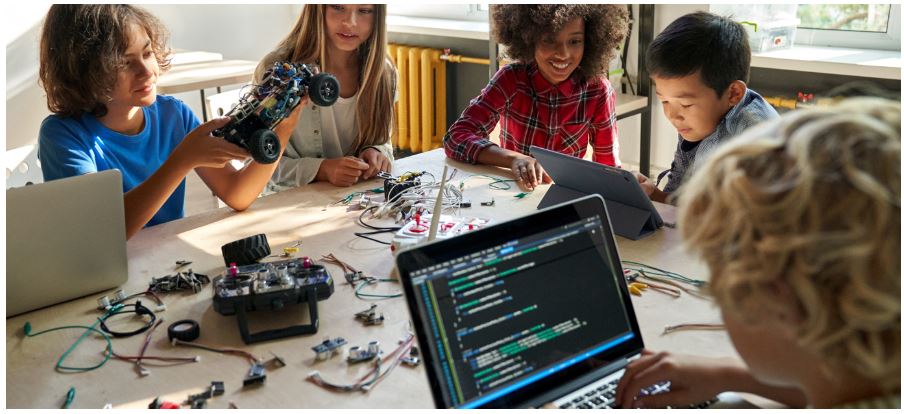
Let’s briefly explore each of the courses you mentioned:
- Machine Learning Course for Beginners: This course is likely designed for individuals who are new to the field of machine learning. Beginners will typically learn the foundational concepts and techniques of machine learning, through interesting and engaging projects such as Yoga Pose detector, Sleep detector, Trash separator etc.
- Introduction to Robotics with Arduino (Blocks/Text):This course is likely focused on introducing students to the world of robotics using Arduino hardware. Arduino is a popular platform for building and programming robots and other electronic projects. Students may learn how to work with Arduino boards, sensors, and actuators. They also be introduced to programming in both graphical blocks and text-based languages.
- Advanced Arduino (Blocks/Text):The advanced Arduino course appears to be a continuation of the introductory course and may delve into more complex projects and applications. Using a smartphone to control the surroundings suggests that students may learn about integrating mobile apps with Arduino projects, potentially through Bluetooth or Wi-Fi connections.
The phrase “control the world” likely implies that students will have the opportunity to work on more ambitious and versatile projects that involve automation and control systems.
These courses provide a comprehensive learning pathway for individuals interested in AI, ML, and robotics. They offer both foundational knowledge and practical skills through hands-on projects.
Related reading :
Conclusion
National Coding Week is a celebration of the incredible world of coding and the myriad benefits it offers. Regardless of age, learning to code can equip individuals with valuable skills that transcend the world of technology. From problem-solving and creativity to employability and empowerment, coding opens doors to a brighter future. This year ,National Coding Week 2023 celebrates the intersection of coding and AI, two dynamic and intertwined fields that promise to shape the future in remarkable ways.
SkoolOfCode is a shining example of an educational institution that prioritizes inclusivity in STEM-based coding education. By offering diverse learning paths, fostering a sense of community, and providing personalized support, they empower students of all backgrounds and abilities to excel in the world of coding and technology.
Unlock the Challenge: National Week of Coding 🧩
Calling all code enthusiasts, from novices to coding wizards! Dive into the world of logic and technology with our Crossword Challenge. Solve the puzzle and share your triumph with us via email at learn@skoolofcode.us.
Don’t miss out on the fun – challenge your brain, embrace the thrill, and become a part of our coding community. Who knows, you might be the next star featured on our website! 🌟
Remember to include your name and age when you send in your solution. Let’s celebrate the National Week of Coding together!” 🚀💻🎉


Ms.Manpreet Virk, an educator at SkoolOfCode with a degree in M.Phil and Master in Computer Science. She is passionate about learning and teaching young minds.
